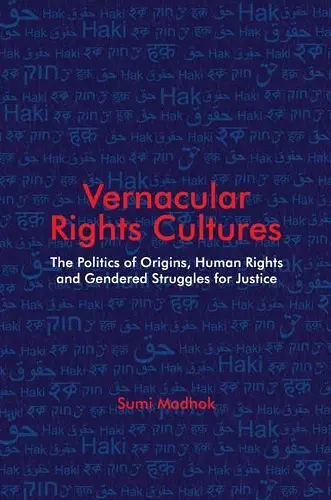Vernacular Rights Cultures
Format:Hardback
Publisher:Cambridge University Press
Published:3rd Feb '22
Should be back in stock very soon
This hardback is available in another edition too:
- Paperback£25.99(9781009423939)

Tracks the critical conceptual vocabularies and the gendered subaltern politics of rights and human rights in South Asia.
The book proposes that decolonising human rights requires historically and politically specific conceptual, empirical and theoretical investigations of rights politics. It tracks contemporary subaltern movements across India and Pakistan to show how and why marginalised groups deploy the language of rights to demand justice.Vernacular Rights Cultures offers a bold challenge to the dominant epistemologies and political practices of global human rights. It argues that decolonising global human rights calls for a serious epistemic accounting of the historically and politically specific encounters with human rights, and of the forms of world-making that underpin the stakes and struggles for rights and human rights around the globe. Through combining ethnographic investigations with political theory and philosophy, it goes beyond critiquing the Eurocentrism of global human rights, in order to document and examine the different political imaginaries, critical conceptual vocabularies, and gendered political struggles for rights and justice that animate subaltern mobilisations in 'most of the world'. Vernacular Rights Cultures demonstrates that these subaltern struggles call into being different and radical ideas of justice, politics and citizenship, and open up different possibilities and futures for human rights.
'Vernacular Rights Cultures: The Politics of Origins, Human Rights and Gendered Struggles for Justice should be essential reading for all political and feminist theorists working on the concept of human rights. In this profoundly original book, Madhok offers us a way through and beyond choices between 'west' and 'non-west' in human rights theory. She shows us that the choice between universalism and particularism in rights theory is mistaken, and that rights are always produced and put to work as part of political struggles in a vernacular which is neither fixed nor self-contained. She uses the tools of feminist historical ontology and ethnography to demonstrate how epistemic agency and authority in the conception of rights is constructed, reconstructed and mobilised within the political imaginaries of haq by women living multiple axes of oppression.' Kimberly Hutchings, author of Time and World politics: Thinking the Present
'This remarkably original and sophisticated exploration of vernacular rights cultures shifts the epistemic centre of global human rights scholarship. Through the innovative methodological device of feminist historical ontology, and her ethnographic study of the idea of haq, Sumi Madhok offers an alternative conceptual apparatus to register the epistemic presence of subaltern groups in the Global South, and to understand how gendered subjects of rights come into being in the vernacular. Madhok's book is a stellar contribution to the decolonization of the political theory of human rights as well as to the field of global intellectual history.' Niraja Gopal Jayal, author of Citizenship and its Discontents: An Indian History
'Madhok's book marks a powerful intervention in existing mainstream as well as critical scholarship on human rights and gender justice. It makes visible the ontological and epistemic violence inflicted by dominant human rights on subaltern groups. By foregrounding conceptual innovations from the standpoint of subaltern struggles and within a vernacular rights culture, this book opens space for a productive engagement with rights. In relating different stories about human rights and modes of subject formation through a shift in standpoint, Madhok offers a radical reorientation and revisioning of human rights scholarship grounded in alternative political imaginaries. Vernacular Rights Cultures is a work that 'most of the world' has been waiting for!' Ratna Kapur, author of Gender, Alterity and Human Rights: Freedom in a Fishbowl
'How do you decolonize human rights? You begin by paying attention to how people pursue rights in most of the world. Seemingly obvious, what this book does is urge us not to see subaltern rights struggles as merely talking back to the centre. If we examine the deployment of rights by tenant farmers in Pakistan, Indigenous peoples in India, desert dwellers in Rajasthan, we can find those moments when an epistemic shift takes place and suddenly we see peeping through the human rights frames we know so well an alternate universe where food security is possible, forests are preserved, and people demand not equality but a future. Through her deeply attentive scholarship Madhok offers us the best gift of all: critique with the possibility of transformation.' Sherene H. Razack, author of Dying from Improvement: Inquests and Inquiries into Indigenous Deaths in Custody
'A marvellous account of subaltern and women's struggles in South Asia and their engagement with human rights … of great interest to scholars and students of decolonial and postcolonial theory, anthropology, South Asia and human rights.' Moritz Koenig, LSE Review of Books
ISBN: 9781108832625
Dimensions: 236mm x 161mm x 20mm
Weight: 420g
224 pages